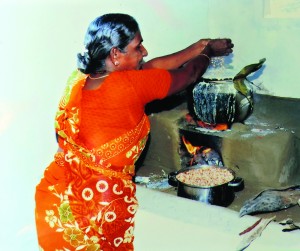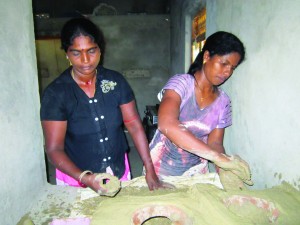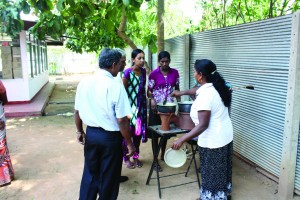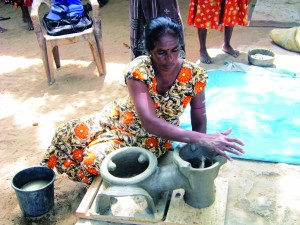Gender Dimensions of Clean Energy: The Benefits of Using Improved Cooking Stoves in Sri Lanka
May 2016, Kilinochchi, Sri Lanka. UN-Habitat in collaboration with the Integrated Development Association (IDEA) introduced Anagi improved cooking stoves (ICS) to over 800 families in the Northern Province in March 2015. Ten months after the introduction of ICS, a survey was conducted to determine its impacts. The survey showed that families found cooking with Anagi improved cooking stoves easier than traditional stoves. It also showed a significant improvement in the health and wellbeing of families as well as their home environment.
Due to the gender division of household labour, women are often the primary users of household energy. In Sri Lanka, 55 percent of the total energy consumed is derived from a variety of biomass resources, of which 80 percent is used for domestic cooking. Approximately 90 percent of rural households use biomass such as fuelwood for cooking. Although biomass is a renewable and widely used source of energy, toxic Green House Gases (GHGs) are released to the atmosphere during burning. Therefore, it is advisable to introduce technologies to reduce the emission of GHGs in domestic cooking and small industries.
UN-Habitat is implementing projects in the North and East of Sri Lanka providing support to conflict affected communities through housing and infrastructure facilities. Accessibility to electricity, LP gas and even kerosene oil is limited in many of these villages. The vast majority of families depend on fuel wood as their basic energy source for cooking. As a result of continuing deforestation, fuel wood is rapidly becoming a scarce resource in these areas.
Apart from the rural energy sector, the current energy consumption pattern in Sri Lanka has implications on agro-forestry as well as the rural economy. A gender-sensitive approach to accessing energy is important as women play an important role in energy usage. Development is not possible without access to energy, while energy is vital for women’s development especially in reducing their time burden in collecting firewood, supporting livelihood activities and improving health and wellbeing.
The ‘Environment Friendly Improved Cooking Stove Project’ was implemented by UN-Habitat with funding from the Indian Housing Project. UN-Habitat selected the promoters, installers, potters and beneficiary families in addition to the overall coordination of the project. IDEA, in collaboration with UN-Habitat, implemented the project on the ground in the districts of Kilinochchi, Mullaitivu, Jaffna and Batticaloa. In addition to training potters in the production of Anagi improved cooking stoves, the initiative also trained community workers to promote and facilitate installation of stoves in households, trained semi-skilled workers to install stoves and improved workshop facilities of the potters. A total of 831 Anagi improved cooking stoves were distributed by the project to families in the four districts.
In order to assess the impact of using Anagi improved cooking stoves, feedback was obtained from 74 users in 13 villages. The survey found that many women spend one to two hours a day gathering fuel wood, leaving them little time for productive or leisure activities. In addition, it places women and girls at risk of long-term health issues while increasing their vulnerability to physical or sexual violence. The majority of the respondents confirmed that the Anagi improved cooking stoves saved cooking time, enabling them to cook more meals during a short time period. In addition, these stoves consume less firewood due to increased thermal efficiency. This has permitted the women to spend more time on other activities such as child care, livelihoods and leisure. The use of Anagi improved cooking stoves has significantly mitigated the negative impacts of using fuelwood whilst promoting women’s empowerment, since more time is spent on other productive and economic activities. Mrs. Y. Easwari from Jaffna mentioned, “The Anagi stove uses less firewood. Therefore I don’t have to collect firewood as often as I used to. Since it takes less time to cook, I save additional time. I now spend less time in the kitchen and more time with my family.”
The respondents observed a marked reduction in the production of smoke by the ICS compared to the traditional stoves. There were also clear reductions in indoor air pollution, thereby reducing smoke related health disorders in women and children, while preventing fire hazards. Research also shows that a well-managed kitchen with an Anagi improved cooking stove and a chimney considerably reduces emissions and air pollution. Hence the introduction of the improved kitchen designs to these target areas is very beneficial. Mrs. R. Swarnamuki from Kilinochchi, a trained promoter of Anagi stoves stated “We did a demonstration study of the use of the Anagi stove, compared to the traditional stove. The difference was very apparent. The Anagi stove took less time and most importantly, produced less smoke. Since I’ve started using the Anagi stove my kitchen isn’t filled with smoke.”
Women are key players in developing energy solutions in Sri Lanka. Two of the five potters trained through this initiative are women, while the majority of Anagi improved cooking stove promoters are women, which has helped build local capacity while providing more economic opportunities for them. Mrs. Y. Jeyarathnam from Batticaloa, a potter by profession was trained in the production of Anagi improved cooking stoves. She stated “There is a high demand for the Anagi stove and I am confident that the market will grow further.”
UN-Habitat recognises that a gender-sensitive approach to energy should focus not only on energy supply, but also highlight social issues related to energy. Gender-blind interventions fail to capture opportunities derived from women’s traditional knowledge and their influencing capacity within the family and communities. Women’s empowerment, especially economic empowerment, increases their bargaining power within the household. Given the positive impact the Anagi stove initiative has demonstrated, UN-Habitat intends to upscale the project in future.




